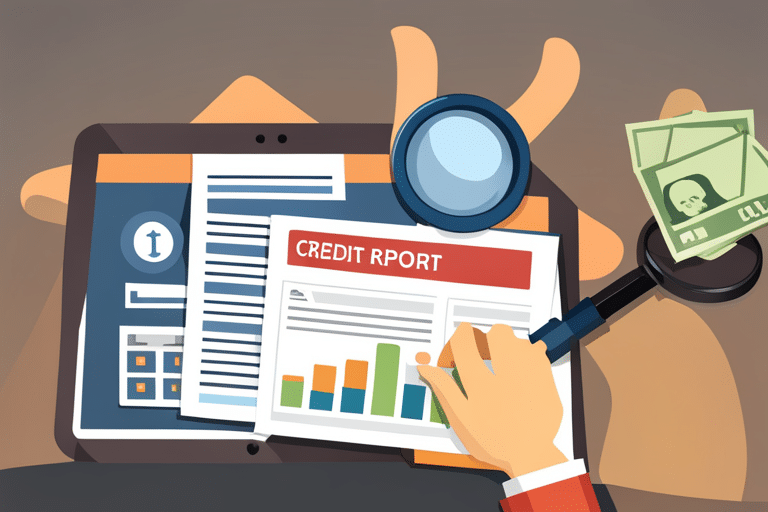Hey, you!
Ever wonder how your credit score affects your insurance rate? Well, get ready to be blown away because we’re about to dive deep into the fascinating world of credit scores and insurance.
You might think it’s just a number, but oh no, my friend, it holds so much power. In this article, we’ll uncover the hidden secrets behind credit scores and why they play such a crucial role in determining your insurance rate.
So buckle up and get ready for some mind-blowing insights!
Key Takeaways
- Credit scores are used by insurance companies as a factor in determining premiums.
- Higher credit scores suggest reliability and lower risk, resulting in potentially lower insurance premiums.
- Low credit scores can raise red flags for insurers and lead to higher insurance premiums.
- Improving credit rating through responsible financial habits can potentially save money on insurance premiums.
Understanding Credit Scores

You may be wondering how credit scores affect your insurance rate. Well, buckle up and get ready for a wild ride because we’re about to dive into the world of credit scores!
Credit scores, my friend, are like the report card of your financial life. They are a numerical representation of your creditworthiness, which is basically a fancy term for how good you are at paying back debts.
Now, when it comes to insurance rates, credit scores play a significant role. Insurance companies use them as one of the factors affecting your premium. You see, insurance companies want to assess how likely you are to file a claim and cost them money. And believe it or not, your credit score can give them some insight into that.
But why does your credit score impact things like loan eligibility and insurance rates? It’s all about risk assessment. Lenders and insurers use credit scores as an indicator of how responsible you are with money. If you have a high score, it suggests that you’re reliable and less likely to default on payments or file excessive claims.
On the other hand, if your credit score is low, it raises red flags for lenders and insurers. They might view you as more of a risk because history has shown that people with lower scores tend to be less dependable when it comes to handling financial obligations.
Why Credit Scores Matter

Alright, buckle up! We’re diving into the world of credit scores and their impact on your insurance premiums.
Brace yourself for a rollercoaster of emotions as we discuss how these three key points – impact on premium cost, correlation with risk, fairness and discrimination – play a role in this wild ride.
Get ready to challenge the status quo and uncover some surprising insights along the way.
Let’s go!
Impact on Premium Cost
If your credit score is low, it can result in higher insurance premiums. Insurance companies use credit scores as one of the factors to determine your premium cost. So, it’s important to understand how your credit rating affects what you pay for insurance coverage.
Now, you may be wondering why on earth would insurance companies care about your credit score? Well, they believe that people with higher credit scores are more responsible and less likely to file claims. Crazy, right? But don’t fret! There are ways to improve your credit rating and potentially save money on your premiums.
Start by paying bills on time, keeping balances low on credit cards, and not opening too many new accounts at once. Small changes can make a big difference in boosting that credit score and lowering those insurance costs!
Correlation With Risk
It’s interesting to note that insurance companies believe there is a correlation between credit scores and the likelihood of filing claims. They use credit score factors in their insurance rate analysis, believing that those with lower credit scores are more likely to file claims. But how does your credit score really affect your risk? Let’s take a look at some hypothetical numbers:
| Credit Score | Number of Claims | Risk Level |
|---|---|---|
| 500 – 600 | 10 | High |
| 601 – 700 | 5 | Medium |
| 701 – 800 | 2 | Low |
| Above 800 | 1 | Very Low |
As you can see, insurance companies believe that those with lower credit scores have a higher risk level and are more likely to file claims. This factor plays a significant role in determining your insurance rate. However, it’s important to remember that this correlation may not be fair or accurate for everyone. In the next section, we will explore the issue of fairness and discrimination when it comes to using credit scores in insurance pricing.
Fairness and Discrimination
Using credit scores as a factor in insurance pricing raises concerns about fairness and potential discrimination. It’s like being judged on your dance moves when applying for a job as an accountant. Sure, your dancing skills might be impressive, but how does that measure your ability to crunch numbers?
Similarly, using credit scores to determine insurance rates may not accurately assess someone’s risk level or their ability to make timely payments. This can result in unfair lending practices and potential discrimination against individuals who have lower credit scores due to circumstances beyond their control. It’s like penalizing someone for tripping over their shoelaces during a marathon race.
We should focus on more accurate ways of assessing creditworthiness rather than relying solely on credit scores.
Factors Affecting Insurance Rates

So, you want to know why your insurance rates are so high?
Well, buckle up because we’re about to dive into the factors that can make or break your premium.
First up, let’s talk about the impact of your credit score – yes, it turns out that how well you handle money can affect how much you pay for coverage.
Next, we’ll hit the road and explore how your driving history influences those pesky numbers on your bill.
And finally, we’ll tackle age and gender factors because apparently being young and female (or old and male) can have an impact on what you shell out for insurance.
Hold on tight, my friend, this is going to be a wild ride!
Credit Score Impact
Your credit score impacts the rate you pay for insurance coverage. It’s not just about your driving record, but also how responsible you are with your finances. Here are four things to keep in mind when it comes to your credit score and insurance rates:
-
Credit Score Factors: Insurance companies take into account various factors such as payment history, amount owed, length of credit history, and types of credit used.
-
Credit Score Range: Your credit score falls within a range that indicates your level of risk as a borrower. The higher the score, the lower the risk.
-
Lower Scores Mean Higher Rates: If you have a lower credit score, insurance companies may view you as a higher-risk customer and charge you higher premiums.
-
Improving Your Score Can Save You Money: By maintaining good financial habits and working to improve your credit score, you can potentially save money on your insurance premiums.
Now that we’ve covered how your credit score affects your rates, let’s dive into how your driving history can influence them even further.
Driving History Influence
When it comes to your driving history, the number of accidents and traffic violations you have can greatly impact the amount you pay for insurance coverage. Let’s face it, we all make mistakes on the road sometimes. Maybe you misjudged the distance between your car and that pesky lamppost, or perhaps you got caught going a little too fast on that open highway.
But fear not! Your driving record doesn’t have to be a permanent stain on your insurance rates. By maintaining a clean driving history, free from accidents and violations, you can show insurance companies that you’re a responsible driver who poses less risk.
Age and Gender Factors
Remember, age and gender are two important factors that insurance companies take into consideration when determining your rates. But don’t worry, these factors are not set in stone and there are ways to navigate through them. Here’s a lighthearted look at how they might impact your insurance pricing:
-
Age: Ah, the joys of youth! If you’re a young driver, brace yourself for higher rates. Insurance companies see younger drivers as riskier because of their limited experience behind the wheel.
-
Gender: Ladies, rejoice! On average, women tend to pay lower premiums than men. Why? Statistically speaking, women are involved in fewer accidents and have fewer traffic violations.
-
Credit Score Factors: Believe it or not, your credit score can play a role in determining your insurance rate too. Insurance companies believe that those with good credit scores are more likely to be responsible drivers.
-
Impact on Pricing: A good credit score can help you secure better rates while a poor credit score might result in higher premiums.
Now that we’ve covered the influence of age and gender on insurance rates, let’s dive into the fascinating link between credit scores and insurance rates…
The Link Between Credit Scores and Insurance Rates

The link between credit scores and insurance rates is significant, as it can greatly impact the cost of your premiums. You might be wondering, how on earth does your credit score have anything to do with your car insurance? Well, my friend, buckle up because I’m about to take you on a wild ride through the world of insurance policies.
You see, insurance companies believe that there is a connection between your credit scores and your claims history. They argue that those with poor credit scores are more likely to file claims and are therefore riskier to insure. Now, I know what you’re thinking – ‘But wait, isn’t that unfair?’ And you’re not wrong! It seems like a bizarre correlation at first glance.
But alas, life is full of unexpected surprises. So if you find yourself with a less-than-perfect credit score, don’t despair just yet. While it may impact your insurance policy options and potentially increase the price of your premiums, it’s not the end of the world.
Now that we’ve explored this peculiar link between credit scores and insurance rates, let’s dive into how these elusive numbers are calculated. After all, understanding how they come up with these magical digits will help demystify this whole process even further. So hang tight and get ready for some math magic coming your way!
How Credit Scores Are Calculated

Hey there, curious credit connoisseur!
Today, we’re diving into the fascinating world of credit scores and how they can impact your life in unexpected ways.
We’ll be exploring the factors that affect these mysterious numbers, like your payment history and debt-to-credit ratio.
Plus, we’ll uncover why having a solid credit history is as important as finding the perfect avocado at the grocery store.
And hold onto your insurance policies because we’ll also be discussing how your credit score can sneakily influence those pesky premiums.
Factors Affecting Credit Scores
Factors affecting credit scores can include payment history, credit utilization, and length of credit history. But wait, there’s more! Here are four other factors that can influence your credit score:
-
Credit mix: Having a variety of different types of credit, like loans and credit cards, shows that you can handle different financial responsibilities.
-
New accounts: Opening too many new accounts in a short period of time can be seen as risky behavior to lenders.
-
Public records: Bankruptcies, foreclosures, and tax liens can seriously hurt your credit score.
-
Hard inquiries: When you apply for new credit, the lender will typically perform a hard inquiry on your credit report. Too many of these inquiries in a short period can negatively impact your score.
Importance of Credit History
So, now that you’ve got a handle on the factors that can affect your credit score, let’s dive into why it’s so important to have a solid credit history.
Understanding your creditworthiness is like having a secret superpower when it comes to navigating the financial world. Your credit history tells potential lenders and insurers how likely you are to pay them back on time, and it plays a big role in determining whether or not you’ll be approved for loans or insurance policies.
But what exactly makes up your credit history?
Well, there are a few key factors that contribute to your overall creditworthiness. These include things like your payment history (did you pay your bills on time?), the amount of debt you have compared to your available credit (known as your credit utilization ratio), the length of time you’ve had credit accounts open, and any recent applications for new lines of credit.
Now that we’ve covered the importance of understanding these credit score factors, let’s move on to how they impact something else near and dear to our hearts: insurance premiums.
Impact on Insurance Premiums
Understanding how your credit history affects your insurance premiums can help you make informed decisions and potentially save money. Your creditworthiness plays a significant role in determining the rates you pay for insurance coverage.
Here are four ways in which your credit score factors into your insurance premiums:
-
Risk assessment: Insurers use your credit history to assess how likely you are to file a claim. A good credit score indicates responsible financial behavior, reducing the perceived risk.
-
Premium calculation: Insurance companies consider your credit score when calculating your premium rates. A higher credit score can translate into lower premiums, while a lower score may result in higher rates.
-
Eligibility for discounts: Some insurers offer discounts based on your creditworthiness. A strong credit history can qualify you for these potential savings.
-
Policy availability: In some cases, a poor credit score may even impact whether or not an insurer is willing to provide coverage at all.
Understanding the impact of good credit on insurance rates is crucial in maximizing potential savings and securing favorable coverage options.
The Impact of Good Credit on Insurance Rates

Improving your credit score can lead to lower insurance rates. Yes, you read that right! Your credit score doesn’t just affect your ability to get a loan or buy a house, it also plays a role in determining how much you pay for insurance. So, if you’re looking to save some money on your insurance premiums, it’s time to give your credit score a little TLC.
But why does your credit score have such an impact on insurance rates? Well, insurance companies use various factors to assess risk and determine the likelihood of you making a claim. And studies have shown that there is a correlation between credit scores and the likelihood of filing an insurance claim. The better your credit score, the less likely you are to file a claim – at least according to the data.
To give you a better understanding of how different credit scores can affect your insurance rates, let’s take a look at this handy table:
| Credit Score Range | Average Annual Premium |
|---|---|
| 300 – 579 | $1,823 |
| 580 – 669 | $1,374 |
| 670 – 739 | $1,126 |
As you can see from the table above, improving your credit score from “Poor” (300-579) to “Fair” (580-669) could save you around $449 per year on average. And if you manage to boost your score into the “Good” range (670-739), you could potentially save even more!
The Consequences of Poor Credit for Insurance Rates

Having poor credit can significantly impact the amount you pay for your insurance premiums. It’s not just about your driving record and the type of car you drive; your credit score plays a big role in determining how much you’ll shell out for coverage. Here are four consequences of low credit that can have lasting financial implications:
-
Higher Premiums: Insurance companies see individuals with poor credit as higher-risk, leading to higher premiums. So if your credit isn’t up to par, be prepared to pay more for your coverage.
-
Limited Options: With a low credit score, you may find it difficult to get coverage from top-tier insurance companies. Instead, you might be left with limited options and have to settle for less comprehensive policies.
-
More Denied Claims: Unfortunately, having poor credit can also result in more denied claims. Insurance companies may view policyholders with low credit as less reliable, making them more likely to deny claims or offer lower payouts.
-
Difficulty Switching Providers: If you’re unhappy with your current provider’s rates but have poor credit, switching to another company may prove challenging. Many insurers use credit scores as a determining factor when deciding whether or not to accept new customers.
As you can see, the consequences of low credit on insurance rates go beyond just paying more each month; they affect the overall quality and accessibility of coverage. But don’t worry! There are steps you can take to improve your situation and lower those premiums by improving your credit score.
Improving Your Credit Score to Lower Insurance Rates

To lower your insurance premiums, take steps to enhance your creditworthiness and increase the chances of getting better rates. Improving your financial habits and effectively managing your credit score can make a significant impact on the amount you pay for insurance coverage.
It may seem unconventional, but believe it or not, your credit score plays a role in determining how much you pay for various types of insurance.
Now, let’s talk about improving those financial habits. Start by making sure you pay all of your bills on time. Late payments can have a negative effect on your credit score, which in turn can lead to higher insurance rates. So set up reminders if needed and stay on top of due dates.
Another way to boost your creditworthiness is by keeping an eye on your credit utilization ratio. This fancy term simply refers to how much of your available credit you’re actually using. Aim to keep this ratio below 30% – the lower, the better! Paying off debts or even increasing your available credit limit can help with this.
It’s also important to regularly check your credit report for any errors or discrepancies that could be dragging down your score unjustly. You deserve mastery over every aspect of your financial life!
By taking these steps and actively managing your credit score, you’ll be well on your way to lowering those insurance premiums.
Now that we’ve covered the importance of improving financial habits and credit score management, let’s dive deeper into the role that our overall credit history plays in determining our insurance rates…
The Role of Credit History in Insurance Rates

Now, let’s delve into how your credit history influences the amount you pay for insurance coverage.
Your credit history impacts more than just loan approvals and interest rates; it also plays a significant role in determining your insurance rates. Here’s how:
-
Credit History Impact: Insurance companies use your credit history to assess your level of financial responsibility. They see it as an indication of how likely you are to file a claim or miss premium payments. So, having a solid credit history can lead to lower insurance premiums.
-
Credit Score Calculation: Insurance companies calculate your credit score using various factors such as payment history, outstanding debt, length of credit history, new accounts opened, and types of credit used. The higher your score, the better chance you have of getting competitive rates.
-
Risk Assessment: Insurance companies believe that individuals with poor credit histories are more likely to file claims and cost them money in the long run. Therefore, they charge higher premiums to offset this perceived risk.
-
Savings Potential: Improving your credit history can help you save on insurance costs in the long term. By paying bills on time, reducing debt levels, and maintaining a good mix of credit accounts, you’ll gradually build a positive credit profile that can translate into lower insurance rates.
Common Misconceptions About Credit Scores and Insurance Rates

One common misconception is that your credit score only affects loan approvals and interest rates, but it also plays a significant role in determining the amount you pay for insurance coverage.
So, buckle up and let’s dive into understanding the relationship between your credit score and insurance rates!
First off, it’s important to debunk the myth that insurers use your credit score to discriminate against you. They’re not sitting at their desks, twirling their evil mustaches, thinking of ways to squeeze more money out of you based on your credit history. No, no! The truth is that insurance companies use your credit score as an indicator of risk. It helps them determine how likely you are to file a claim in the future.
Think about it this way: if someone has a poor credit score, it could mean they’re facing financial difficulties or making risky decisions with money. And unfortunately, those same behaviors can translate into reckless behavior on the road or negligence in protecting their property.
So now that we’ve cleared up some common misconceptions about credit scores and insurance rates, let’s talk about taking control of your credit for better insurance rates. By improving your credit score through responsible financial habits like paying bills on time and reducing debt, you can show insurers that you’re a responsible individual who poses less risk.
In the next section, we’ll explore some practical tips and strategies to help you boost your credit score and ultimately save money on your insurance premiums. So stay tuned because there’s plenty more knowledge coming your way!
Taking Control of Your Credit for Better Insurance Rates

Improve your financial habits and watch as your credit score positively impacts the amount of money you pay for insurance coverage. Taking control of your credit is not just about getting better rates on loans or credit cards, but it can also have a significant impact on your insurance premiums. So, if you want to save some extra cash and improve your financial health, here are a few tips to help you manage your credit score:
-
Pay your bills on time: Late payments can seriously damage your credit score. Set up automatic payments or reminders to ensure you never miss a due date.
-
Keep credit card balances low: High utilization rates can negatively affect your credit score. Aim to keep your balances below 30% of the available credit limit.
-
Avoid opening unnecessary accounts: Opening too many new accounts within a short period of time can lower your average account age and hurt your credit score. Only open new accounts when necessary.
-
Regularly review and dispute errors on your credit report: Mistakes happen, so make sure to check for errors on your credit report regularly. Dispute any inaccuracies that could be dragging down your score.
Frequently Asked Questions
What Are Some Potential Disadvantages of Using Credit Scores to Determine Insurance Rates?
Using credit scores to determine insurance rates can have potential consequences, especially for low income individuals. It may unfairly impact their ability to access affordable insurance and create financial hardships.
Are There Any Laws or Regulations in Place to Protect Consumers From Unfair Insurance Rate Practices Based on Credit Scores?
Don’t worry, there are laws in place to protect you from unfair insurance practices based on credit scores. Consumer protection laws ensure that insurance companies can’t use credit scores as an excuse to overcharge you.
How Long Does It Typically Take to See an Improvement in Insurance Rates After Improving Your Credit Score?
Improving your credit score can have a positive impact on your insurance rates. But how long does it take to see the improvement? Well, that depends on various factors like your current score and history.
Can Insurance Companies Use Factors Other Than Credit Scores to Determine Insurance Rates?
Insurance companies can consider alternative factors, like driving record and claims history, to determine your insurance rates. However, credit scores do have a significant impact on premiums, so improving yours can still save you some serious cash.
Are There Any Insurance Companies That Do Not Consider Credit Scores When Determining Insurance Rates?
Some insurance companies don’t care about your credit score when setting rates. They focus on alternative factors like driving record and claims history. So, don’t stress over those digits! There are options out there for you.
Conclusion
Congratulations! You’ve reached the end of this enlightening journey into the fascinating world of credit scores and insurance rates.
Armed with this newfound knowledge, you now have the power to take control of your credit and secure better insurance rates.
Remember, your credit score is like a superhero cape, swooping in to save you from sky-high premiums.
So go forth, my friend, and unleash your inner credit champion!
With a little effort, you’ll soar to new financial heights that will make even Superman jealous.

